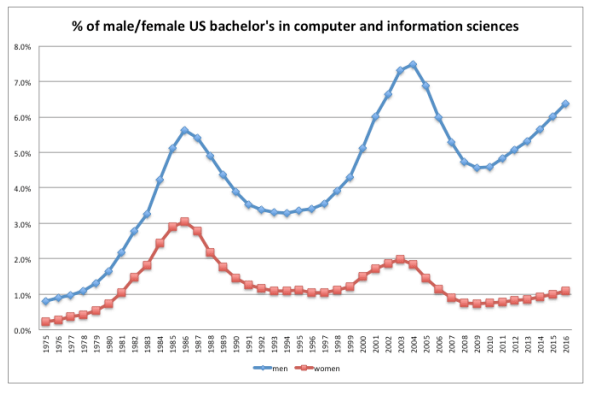You have /5 articles left.
Sign up for a free account or log in.
A year ago, Google fired an engineer who had circulated a memo questioning the company's efforts to recruit more women, suggesting that the efforts wouldn't work and that there was no large-scale problem in the tech industry with regard to its treatment of women. Many in academe were among those who condemned the memo and said that higher education could play a key role in attracting more female tech talent.
Now a new manifesto against diversity efforts in technology has been published, and this one comes from a faculty member at the University of Washington. It suggests that efforts to recruit more women to become computer science majors are doomed to fail, in large part because of what the author sees as personality differences between men and women, and based on women's choices.
The piece defends James Damore, the fired Google engineer, and says colleges and universities are unwilling to grapple with his ideas. By focusing on "equity" (trying to even out the share of women and men) as opposed to "equality" (making sure that all are welcome), academe is wasting time and money, says the essay.
The author is Stuart Reges, a principal lecturer at the university's Paul G. Allen School of Computer Science and Engineering. His piece is being criticized by his colleagues at the university, but some there also note that Reges has an outstanding track record as a mentor for women in computer science. Others are pointing out that Reges's analysis runs counter to extensive studies on the gender gap in computer science and sexism in the field. And they say his essay promotes gender stereotypes and could discourage female students at Washington and elsewhere. The essay -- "Why Women Don't Code" -- was published in Quillette.
Reges starts his essay by saying that he wanted to know more about the ideas that got Damore fired. "You might imagine that a university would be more open to discussing his ideas, but my experience suggests otherwise," Reges writes.
He says that it's important to consider the possibility that Damore was correct.
 Using data from the Digest of Education Statistics (at right), Reges notes that computer science has gone through "boom and bust cycles" among undergraduates, and that the numbers of male and female students awarded degrees in the field went up and down at the same time. This suggests to Reges that the enrollment patterns are linked to general views of computer science, and are not gender specific.
Using data from the Digest of Education Statistics (at right), Reges notes that computer science has gone through "boom and bust cycles" among undergraduates, and that the numbers of male and female students awarded degrees in the field went up and down at the same time. This suggests to Reges that the enrollment patterns are linked to general views of computer science, and are not gender specific.
Reges argues that women are in fact welcome in computer science and that discrimination does not explain their lower numbers. Rather, he writes that there are differences between men and women than are at play. And while Reges notes that such claims are controversial, he also writes that diversity proponents should believe that, given their push for more women in male-dominated fields. "The entire goal of achieving gender diversity makes no sense unless you believe that men and women work in fundamentally different ways," he writes.
Men and women may well make different choices, Reges writes, but this doesn't mean anyone is doing anything wrong.
"A dangerous narrative has been taking hold in recent years that the gender gap is mostly the fault of men and the patriarchal organizations they have built to serve their interests," he writes.
At his university and elsewhere, Reges writes, faculty members have reached out to women with the potential to succeed -- and those efforts have grown the number of women in the field.
"At the University of Washington, we have managed over the last 10 years to increase the percentage of women taking our first course from 26 percent to 41 percent and to increase the percentage taking the second course from 18 percent to 31 percent. In the early years, we were able to go from 16 percent women in our major to 30 percent, but we have made no additional progress since," he writes, adding that other universities have similarly plateaued.
By welcoming women, he writes, "we have harvested the low-hanging fruit by eliminating overt discrimination and revamping policies and procedures that favored men." But the leveling off of numbers reflects the choices of women, not discrimination. And further gains are unlikely, he writes.
"Our community must face the difficult truth that we aren’t likely to make further progress in attracting women to computer science. Women can code, but often they don’t want to. We will never reach gender parity. You can shame and fire all of the Damores you find, but that won’t change the underlying reality," wrote Reges. "It’s time for everyone to be honest, and my honest view is that having 20 percent women in tech is probably the best we are likely to achieve. Accepting that idea doesn’t mean that women should feel unwelcome. Recognizing that women will be in the minority makes me even more appreciative of the women who choose to join us."
Reges notes in his piece that he's an iconoclast and that Stanford University fired him as a computer science instructor in 1991 for his protest of antidrug policies by boasting that he favored drug use and carried drugs with him on campus.
And Reges writes that he realizes he could face job consequences for his essay. "Saying controversial things that might get me fired is nothing new for me," he writes. "My attitude in all of these cases has been that I need to speak up and give my honest opinion on controversial issues. Most often nothing comes of it, but if I can be punished for expressing such ideas, then it is even more important to speak up and try to make the injustice plain."
Immediate Reaction -- and the Research
Some have praised the article. Among them is Kasey Champion, a female engineer at Microsoft who credits Reges for encouraging her (as a student) to pursue a computer science degree and considers him a valued mentor. She notes in an article on Medium that Reges calls for an end to discrimination and differs with current diversity efforts only in questioning their assumption that more needs to be done beyond ending overt bias.
"I read this as Stuart asserting that we must instead eliminate systematic barriers to achieve equality," Champion writes. "This ensures that the institution is not passive, simply pulling from the students that self-select and prepare their applications. Instead an institution must also be actively invested in discovering and developing students who are equally talented but less likely to find their way into the pipeline. Theoretically this ensures that nothing stands in the way for those that do have the passion and talent regardless historic levels of opportunity or access. It is not equality of outcome but equality of opportunity that is the focus."
The current efforts to increase the share of tech enrollments and employees who are women amount to "training men to resent us," she writes.
Reaction to the piece has been speedy -- and largely critical. Some have called on the university to fire Reges and said that the university's efforts to distance itself from Reges's comments (while not punishing him) do not go far enough.
Reges is of course not the first male academic to suggest that women's choices -- and not sexism -- are responsible for the gender gaps that remain in certain disciplines. Recall the comments that Lawrence Summers made in 2005, while president of Harvard University, suggesting that women were on average unwilling to work the long hours of men in top positions in science and other fields. He said that this may be related to the demands of raising children, which still fall more on mothers than on fathers. (He subsequently apologized for not recognizing the role of discrimination and socialization in shaping academic and career choices.)
Today there are numerous studies and projects showing that women are achieving the same level of excellence in science fields as men. Last year, for example, was the first in which women outnumbered men in medical school enrollments, which were once dominated by men.
While Reges is correct that national data show women lagging men in computer science enrollments, many would question his assertion that sexism in the tech industry is not a major deterrent to women who have the smarts to enter the industry. Consider the reports here and here.
It's also not true that universities all plateau in computer science and engineering enrollments. Worcester Polytechnic Institute, a STEM-oriented university, made a series of changes in its recruitment strategies last year and saw the share of female students in its first-year class grow from 34 to 43 percent.
At Carnegie Mellon University, which is highly regarded for its teaching and research in computer science, the proportion of first-year women in computer science hit 48.5 percent last year. The university credits a series of efforts to recruit and mentor female students in showing that it's possible to get very close to gender parity in computer science enrollments.
A team of researchers led by Linda Sax of the University of California, Los Angeles, is studying the reasons that female enrollments have not gone up in most computer science programs. The project is focusing on the first computer science course that students take. Using data from 15 universities nationwide, the team has noted that women tend to be farther along with their college studies that are men when taking their first computer science course. In addition, women are less likely than men to have taken computer science in high school. While results are still preliminary, researchers believe that colleges can respond to this information in ways that will encourage more women to major in computer science. The researchers also believe that a lack of role models may play a part and that academic programs should consider ways to make women aware that they can succeed in the field.
University of Washington Responds
At the University of Washington, the computer science and engineering college responded immediately to the Reges essay with a series of tweets (thread may be read here) stating that officials there remain committed to increasing the enrollment of women in computer science programs. Currently about 38 percent of new admits are women.
The college then issued a longer statement outlining its diversity efforts and stating explicitly that educators there believe that the share of women in the field can and should go up.
"Women are interested in CS and women do code!" the statement says. "It is central to the mission of the Allen School to pursue initiatives that broaden participation in CS. Furthermore, we do not believe that where we are today is the best we are likely to achieve. We continue programs at all levels that focus on building interest among women in CS. We are currently expanding our efforts to include a focus on underrepresented minorities, students with disabilities, and economically disadvantaged students. Beyond recruiting new people to the field, it is crucial to create and nurture an environment where all students -- especially members of underrepresented groups -- feel supported."
The statement did not mention Reges by name. But it said, "All members of the Allen School are entitled to share their ideas freely, and no one among our leadership has any interest in silencing or censoring people even when they express controversial ideas. However, our leadership also has the right and the responsibility to affirm our values and to discuss the many ways in which we are supporting and will continue to support those values."
The university referred questions about its response to the essay to Ed Lazowska, who has taught in the computer science department for more than 40 years and is a former chair. Via email, he noted Reges's reputation for supporting his female students, but also stressed his disagreement with the article.
"Speaking personally, I disagree with the conclusions of Stuart’s post, but I found it thought-provoking and I encouraged others on the faculty to read it (prior to it going viral!). Certainly there are differences between genders. But I believe that there are so many other factors at work that we can’t possibly say what the role of gender differences might be, and we can't possibly suggest what the 'ceiling' might be for the participation of women in the field," Lazowska wrote. "What factors? Parental encouragement and expectations. Early exposure to technology. Stereotypes about programmers and programming. Perceptions of the work culture in the software industry. Socioeconomic factors. Sexual harassment. Failure to communicate the empowering role of computer science in so many fields and careers. Impostor syndrome. Stereotype threat. Implicit bias. I could go on and on."
He added that "the whole thing is reminiscent of the Larry Summers episode: sure, there are gender differences, but to suggest that they are dominant or limiting, given all the other factors that our society has yet to address, is more than a stretch."
What about women in courses taught by Reges? Might they feel concerned about being taught by him?
"Stuart will continue his approach to teaching introductory computer science -- an approach that has been highly successful in encouraging women to choose the field as a major and as a career, including women who had never considered it before," Lazowska said. "Stuart believes deeply in women’s ability to excel in computer science, and he has worked tirelessly and successfully over multiple decades at multiple universities to increase their participation in the field. His essay concerned women’s interest in the field, not their ability to excel. I disagree with his analysis -- I don’t believe that we are anywhere close to having 'harvested the low-hanging fruit' that contributes to the underrepresentation of women in our field. Predictably, in retrospect -- particularly given these highly polarized times -- an essay that might have stimulated a debate is instead provoking a backlash."








